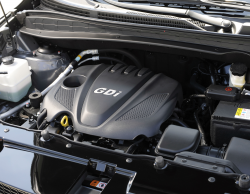
— Hyundai and Kia engine fires have caused at least 11 class action lawsuits based on allegations that defective GDI (gasoline direct injection) engines are at risk of stalling or going up in flames.
In March, four plaintiffs filed two class action lawsuits against Hyundai and Kia which were consolidated in April. The plaintiffs then filed a consolidated class action alleging the vehicles are equipped with defective GDI engines.
The consolidated complaint alleges claims against Hyundai and Kia for fraudulent concealment, breach of implied warranty, unfair competition, false advertising and violations of consumer protection laws.
The lawsuit is just one of 11 lawsuits filed in four jurisdictions, with five actions consolidated in the Central District of California.
One of the consolidated class action lawsuits include 2011-2013 Hyundai Tucson, 2012-2016 Kia Soul and 2011-2012 Kia Sportage vehicles equipped with GDI engines at risk of catching fire.
The lawsuit alleges consumers don't trust Hyundai and Kia and now that the public is aware of engine fires through media reports, the vehicle resale values have dropped into the basement. Customers allegedly didn't get the vehicles they bargained for and years went by without any adequate repairs.
The plaintiffs claim no amount of recalls will repair the damage caused by actions taken by Hyundai and Kia.
Much of the lawsuit references recalls and other actions taken by the automakers and the government concerning GDI engine problems.
One of those recalls involve 2012-2016 Kia Souls with catalytic converters that could overheat and damage the connecting rods. Kia said the problems could cause larger problems that result in oil leaks and complete failures of the engines.
Another recall was ordered for oil pan problems in 2011-2013 Hyundai Tucsons and another recall included 2011-2012 Kia Sportage vehicles that could cause engines to turn to flames.
Hyundai also recalled 470,000 vehicles in September 2015 and expanded the recall by 572,000 vehicles in 2017, while Kia recalled more than 618,000 vehicles because of engine problems.
Then there are the actions taken by the National Highway Traffic Safety Administration (NHTSA), which opened an investigation into the recalls of 1.7 million Hyundai and Kia vehicles, then expanded the probe based on about 400 engine-related complaints.
Congress is also mentioned in the lawsuit because Hyundai and Kia were invited to answer questions about the GDI engine fires. However, the automakers were a no-show for the hearing.
On August 9, Judge James L. Robart vacated all case deadlines and told the plaintiffs to amend their lawsuit by August 29, 2019, in response to Hyundai's motion to dismiss. Hyundai will then have until November 1 to file another motion to dismiss the suit.
The Hyundai and Kia engine fires lawsuit was filed in the U.S. District Court for the Western District of Washington at Seattle - Short, et al., v. Hyundai Motor America, Inc., et al.
The plaintiffs are represented Keller Rohrback.
Check out other legal actions taken against Hyundai and Kia concerning engine issues.
- Hyundai Engine Oil Sludge Lawsuit Filed in Illinois
- Hyundai/Kia Engine Lawsuit Says Theta II Engines Defective
- Hyundai Engine Lawsuit Names Sonata, Tucson and Santa Fe
- Hyundai Santa Fe Engine Stall Class-Action Lawsuit Settled
- Hyundai Sonata Class-Action Lawsuit Will Be Approved
- Hyundai Sonata Engine Lawsuit Nears the End
- Hyundai Sonata Engine Failure Lawsuit Filed in California
- Hyundai Santa Fe Class-Action Lawsuit Filed Over Stalling Engines
- Kia Lawsuit Says Connecting Rod Bearings Leave Metal in Oil
- Kia Theta Engine Lawsuit Says GDI Engines Have Problems
- Kia Sorento Class-Action Lawsuit Targets Engine Problems




